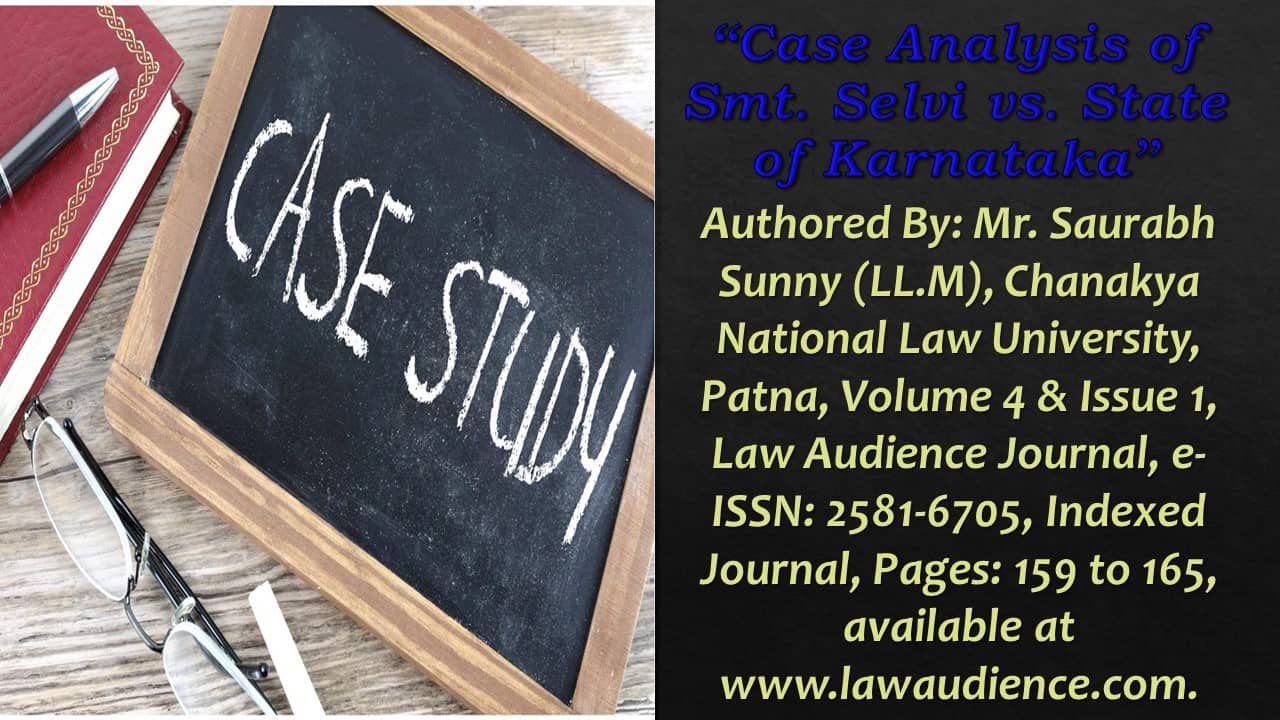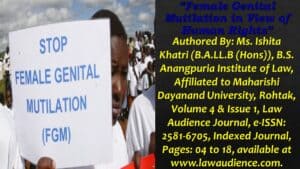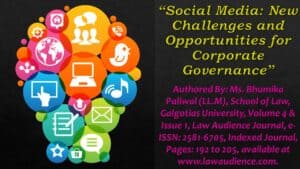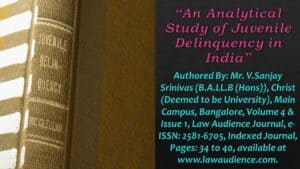Click here to download the full paper (PDF)
Authored By: Mr. Saurabh Sunny (LL.M), Chanakya National Law University, Patna,
Click here for Copyright Policy.
ABSTRACT:
“On the one hand, recent advances and the exponential growth of new scientific innovations have made investigation processes more efficient, but on the other hand, they have introduced new facets and complexities in terms of admissibility of evidence. The criminals’ increased vigilance and sophistication have necessitated the development of new investigative techniques. As a result, the admissibility of evidence in court is inherently complicated. As a result, India has seen an increase in tests like narcotics analysis, DNA profiling and brain fingerprinting”.
I. NARCO ANALYSIS[1]:
Narco analysis is a method of psychological investigation in which a subject is given a barbiturate drug in order to lessen their conscious or unconscious reluctance to express their memories or feelings. This reluctance may be conscious or unconscious. It is one of the more recent technological advancements, the use of which has skyrocketed in India over the course of the past few years. The term “anaesthesia” is where the concept of “Narco Analysis” originates from.
The term “narco-analysis” was first proposed by Horseley, who defined it as a “psychotherapeutic process using psychotropic drugs, like barbiturates, which causes a stupor thus inducing the mental faculties of a person related to the offence in question to come to the surface, so that they can be exploited by a therapist.”
Horseley is credited with coining the term “narco-analysis,” and he is also credited with providing its definition. During the Narco analysis test, the subject’s inhibitions are lowered by interfering with his nervous system on a molecular level in order to simulate the effects of using narcotics. Lying becomes more difficult for him to do in this state, although it is still possible for him to do so.
II. POLYGRAPHY TEST[2]:
A polygraph is a device that measures the physiological responses of people being interrogated in order to determine whether or not they are being truthful with their answers. One can use it to keep track of vital signs such as heart rate, blood pressure, and respiration as well as the skin conductivity. As a lie detector, the polygraph relies on the belief that deceptive answers will produce physiological responses that can be distinguished from those associated with honest answers. The underlying principle of these tests is dubious because the measured changes in arousal state are not always triggered by lying or deception. Nervousness and anxiety, fear, confusion and hypoglycaemia are all possible triggers for these symptoms. Rather than being caused by the use of drugs, these symptoms could also be caused by the withdrawal of alcohol or other substances. As a result, this state of affairs has been linked to the manner in which investigators ask questions. However, a trained person who is able to control or suppress his or her arousal symptoms through relaxation exercises, Yoga, meditation, etc. can easily beat polygraph tests.
III. INTERNATIONAL TAKE ON SELF INCRIMINATION[3]:
People who are being interrogated or tried by the police have the legal right to remain silent. Many legal systems around the world acknowledge the rule of law, whether explicitly or implicitly. The right to refuse to answer questions is at the heart of the movement. The right to remain silent or the right not to answer any questions are two examples of this. The right to refuse to answer questions before or during a trial or hearing usually includes the provision that the judge, the jury, or any investigator cannot make any negative comments or inferences about the refusal to answer questions.
The Supreme Court of India noted in Aloke Nath Dutta vs. State of West Benga[4], that Article 20(3) of the Indian Constitution prohibits anyone accused of an offence from being forced to testify against himself in court. Because of our constitution, we have a fundamental right to remain silent. The court must exercise caution when construing a retracted confession in light of Article 20(3)’s guarantee as well as Article 21’s humanising standards. Extending one’s civil liberties by withdrawing from previous statements is analogous to exercising one’s right to remain silent.
A fair trial is protected by Article 6 of the European Convention on Human Rights. Defendants’ immunity from self-incrimination is protected by Section 2 of Article 6 of the Constitution. When a person is accused of committing a crime, he or she is presumed innocent until proven guilty in accordance with the law, according to the convention. Section 3 provides additional information on the minimum rights of an individual accused of a crime. A human rights treaty that aims to prevent torture and cruel, inhuman or degrading treatment or punishment around the world is the United Nations Convention against Torture. The Convention forbids states from transporting people to any country where there is a reasonable expectation that they will be tortured, and states are required to take effective measures to prevent torture within their borders.
The Committee on the Elimination of Torture (CAT) is a group of human rights experts that monitors the implementation of the Convention by States. According to the Convention, every state party is required to provide the CAT with regular reports on the implementation of rights. Once a state has ratified the Convention, it must submit a report within a year and then report every four years after that. Individuals who believe their rights under the Convention have been violated may file complaints or communications with the CAT.
Self-incrimination has been handled in a variety of ways in different countries.
III.I ENGLAND AND WALES[5]:
In a criminal trial, a defendant has the option of testifying or not. To top it all off, there’s no legal obligation for citizens to help the police with their investigations. When a defendant fails to mention any facts, he later relies on and which in the circumstances at the time the defendant could reasonably be expected to mention; fails to give evidence or answer any questions; fails to account on arrest for objects, substances or marks on his person, clothed or otherwise; or fails to answer any questions at trial, adverse inferences may be drawn. Silence alone may not be sufficient to establish guilt. The court must instruct the jury as to the limits of the inferences that can be drawn from silence in cases where inferences can be drawn. Section 2 of the Criminal Justice Act 1987 restricts the right to silence for those questioned by the Serious Fraud Office. For those accused of terrorist offences, the right to freedom of speech has been reduced.
III.II SOUTH AFRICA[6]:
“Everyone who is arrested for allegedly committing an offence has the right; To remain silent; To be informed promptly; and to be released as soon as possible,” reads Section 35 of the 1996 Constitution. In respect of one’s right to remain silent Regarding the repercussions of not keeping one’s mouth shut Confessions or admissions that could be used against a person are not required; No one can be forced into providing self-incriminating evidence, even if they’ve been accused of a crime.
III.III CZECH REPUBLIC[7]:
Two clauses in the Charter of Fundamental Rights and Basic Freedoms of the Czech Republic guarantee the right to remain silent. Anyone can refuse to make a statement in Article 37, Clause 1 if doing so would put themselves or someone close to them in jeopardy. “An accused person has the right to refuse a statement; he/she must not be deprived of this right in any way,” reads Article 40, clause 4.
IV. SMT. SELVI VS. STATE OF KARNATAKA[8]:
Narcoanalysis, brain mapping, and polygraph tests were found to be abusive by the Indian Judiciary in Smt. Selvi vs. State of Karnataka[9], a historic and long-awaited decision. “Cruel, inhuman, and degrading treatment” was deemed a violation of the law, and such tests were outlawed. Deception detection tests like narco analysis and brain fingerprinting are under fire by India’s Supreme Court for their validity, reliability, and utility. In questioning the scientific reliability of the tests, it stated, “Some studies have shown that most of the drug-induced revelations are not related to the relevant facts and they are more likely to be in the nature of inconsequential information about the subjects’ personal lives.” It emphasised the possibility that these tests could uncover inaccurate or even misleading information.
Some narco-analysis and brain fingerprinting subjects may be “extremely suggestible to questioning,” while others may “concoct fanciful stories,” according to the courts. It is possible for a subject to be falsely implicated in a crime because of prior exposure to test stimuli, such as through media reports, investigators’ revelations of facts, or the witness’ connection to the crime. There is a possibility of “nervousness, anxiety, fear, confusion or other emotions” in polygraph responses. The courts also noted the possibility of “memory hardening,” which is a process by which the subject has created and solidified false memories about an incident. Narcoanalysis, brain mapping, and polygraph testing have all been declared by the Supreme Court of India to be in violation of Article 20(3) of the Indian Constitution, which protects people from being forced to testify against their will. Narcoanalysis and other tests permitted by Article 20 of the Constitution were upheld by several High Courts on the basis of various arguments. The Madras High Court ruled that even though a subject may be forced to undergo narcoanalysis in the first place, the statements made during the ensuing tests are voluntary in nature themselves.
For Article 20(3), the Karnataka High Court defined “compulsion” as “duress” that involved serious physical harm or threat, and found that the mild pain of an injection necessary for the narcoanalysis test did not reach the required level of pain to constitute compulsion. According to Bombay and Delhi, narcoanalysis cannot violate Article 20(3) because statements cannot be known until after the test is administered, which is the case here. Further, the Delhi High Court stated that statements made during narcoanalysis could be admitted as corroborative evidence in court. The Supreme Court stated: “The arguments of the High Courts have been rejected completely.” Forcing an individual to undergo narcoanalysis, brain-mapping and/or polygraph testing, regardless of whether or not physical harm was done during administration, constitutes a form of compulsion. Because the answers given during the test are not consciously and voluntarily given, the results from all three tests amount to the requisite compelled testimony required to violate Article 20(3). The responses given during the tests, even if they were given voluntarily at the beginning, are non-voluntary. Narcoanalysis and other testing methods are not reliable, valid, or useful as investigative tools for criminal cases, according to the Supreme Court’s decision.
VI. CONCLUSION:
There should be no direct use of the results of these tests for incriminating the defendants. However, these findings may serve to bolster other evidence and serve as a supporting element in the investigation. It is stated in the Indian Evidence Act, Section 27 that if new facts are discovered after a confession is given in front of a police officer, such acts may be admissible. Because of this, Section 27 of the Indian Evidence Act is an exception to the general prohibition on the admissibility of a confession made in front of a police officer. It is a major argument against Section 27 discovery of facts leading to the likelihood of self-incrimination that such results can only be admissible if they were not obtained under duress.
S.161 of the CrPC and Article 20(3) of the European Convention on Human Rights both prohibit the forcible disclosure of personal knowledge relevant to the facts at issue, and thus, the right of self-incrimination in these cases is ineffective. Nevertheless, the CrPC’s articles 20 (3) and 161 (2) guarantee protection against “involuntary” “self-incrimination,” but not against “involuntary” incrimination of “any other person.”
As a result, “compulsion” to obtain information incriminating “any other person” besides the subject or his accomplice, whether inside or outside of police custody, is legal. People who “are supposed to be acquainted with the facts and circumstances” of the case can be “involuntary” subjected to such tests if they are not “exposing themselves or their accomplices if any” to a “criminal charge” by such disclosure. Finally, in terms of the likelihood of being implicated in one’s own crimes, anyone who is “well-informed” about a case can be “compelled” to testify as a witness. However, he or his accomplices will not be “exposed” to criminal charges as a result of this “compulsion.” A witness can be “compelled” to testify against any “other person” except for his or her own accomplice. For anyone else, the only protection against “involuntary” “self-incrimination” stems from S.161(2) of the CrPC, which grants a statutory right against “involuntary” “self-incrimination.”
The theory of exculpatory or inculpatory statements of admissions further weakens the right against self-incrimination. It is possible for a statement made by an accused person to be both exculpatory and inculpatory. According to Article 20(3), the Constitution prohibits incriminating remarks. “…as at the time of conducting the test, it could not possibly be known whether the results will eventually prove to be inculpatory or exculpatory for the accused,” the Karnataka High Court stated in Smt. Selvi and Ors. vs. State by Koramangala Police Station [2004 (7) Kar LJ 501].” According to the same ruling, “…testimony given under duress might not lead to exposure to criminal charges in some cases.” There is a possibility that the person undergoing the test may be granted immunity from using their testimony against them directly, indirectly, or in a transaction.”
To summarise, the use of narco-analysis as an investigative tool or as evidence violates the right to life, liberty, and the right to be free from being incriminated in one’s own defence. It is possible that innocent people could be wrongly imprisoned due to the inaccuracy of the procedure and the psychological effects of drugs. For example, the logic of ‘minimal bodily harm’ being permissible for extracting information offered to uphold narco-analysis has grave implications for third-degree coercion, especially in the context of growing curbs on rights in the name of combating terrorism. Narcoanalysis and brain mapping are invasive methods that should be outlawed by the democratic rights movement.
Cite this article as:
Mr. Saurabh Sunny, “Case Analysis of Smt. Selvi vs. State of Karnataka”, Vol.4 & Issue 1, Law Audience Journal (e-ISSN: 2581-6705), Pages 159 to 165 (16th May 2022), available at https://www.lawaudience.com/case-analysis-of-smt-selvi-vs-state-of-karnataka/.
Footnotes & References:
[1] Dr. Pradeep Kumar Singh, Associate Professor, Narco-Analysis Test and Law in India, available at https://madhavuniversity.edu.in/nacro-analysis-test.html#:~:text=The%20term%20Narco%2Danalysis%20is,affects%20come%20to%20the%20surface%2C.
[2] Polygraph, available at https://en.wikipedia.org/wiki/Polygraph.
[3] Self-incrimination, available at https://en.wikipedia.org/wiki/Self-incrimination.
[4] 2006 (13) SCALE 467.
[5] supra note 3.
[6] Ibid.
[7] Ibid.
[8] Criminal Appeal 1267 of 2004 2010(7) SCC 263.
[9] Ibid.




